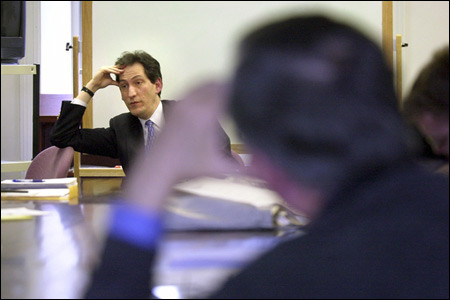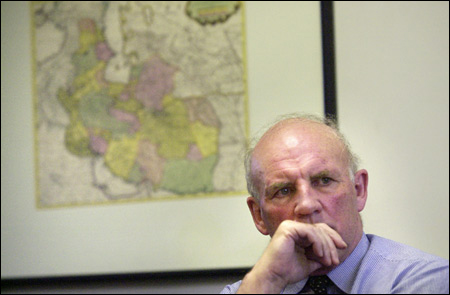Provocative, alternative look at ‘Arab liberals’
‘Liberal reformers in much of the Arab world are considered tools of the West’

The Middle East is not Eastern Europe.
An obvious point, and yet one that U.S. foreign policy-makers have apparently failed to grasp, according to Jon Alterman, director of the Middle East Program at the Center for Strategic and International Studies, a Washington-based independent think tank.
Alterman presented his ideas Tuesday (Feb. 24) at the Center for Middle Eastern Studies in a talk provocatively titled, “Is It Time to Give Up on Arab Liberals?” Alterman’s answer is yes, but the alternative he advocates is not to substitute the stick for the carrot, as the title of his presentation might suggest. His belief, rather, is that the carrot is being offered to the wrong faction.
The mistake is understandable, Alterman pointed out, considering that current Middle East policy is largely the product of veterans of the Cold War, people such as Richard Perle, Paul Wolfowitz, and Elliott Abrams.
Based on their experience, it seems logical that what worked in America’s prolonged struggle with the Soviet Union should work in the Middle East. America’s Cold War strategy was to contain the spread of communism while supporting liberal elements within the Soviet bloc. Meanwhile, communications tools like Voice of America countered Soviet propaganda “and kept alive a flickering hope of freedom.”
But in fact there is a crucial difference between the two regions, Alterman said.

“In Eastern Europe, communism was a foreign import. In the Middle East, it’s the liberals who are seen as foreigners. Liberalism remains suspect. It is seen as a plot to weaken and subjugate Arab societies rather than strengthen them.”
Alterman said that his ideas have evolved as a result of talks with many people in the Middle East and that he is troubled by the conclusions he has reached, but he still feels that the United States is trying to achieve its goal of democratizing the Middle East in exactly the wrong way.
“Liberal reformers in much of the Arab world are considered tools of the West, and U.S. efforts have been ineffectual and counterproductive,” he said.
According to Alterman, liberal elites in Arab countries constitute an aging, increasingly isolated group that has largely lost its agenda-setting role. New communications technologies have allowed new elites to arise by appealing to people at the grassroots level, both locally and globally. Many of these new opinion leaders embrace agendas that the West is uncomfortable with, such as theocratic government and limitations on the rights of women.
Alterman’s point is that we cannot afford to give these groups the cold shoulder because the society they are trying to establish does not coincide with our idea of democracy. It is they, and not the liberal elites, who represent our best chance at constructive engagement with the Arab world.
“What do we do with Arab liberals? Not cast them off, but we have to recognize that they are unlikely by themselves to be effective catalysts for change. If we continue to engage with them exclusively, we run the risk of drawing them even further outside their own society.”
Alterman’s recommendation is that the United States work with broader publics in the Middle East and work toward more modest goals.
“We always try to make everybody love us. Everybody isn’t going to love us. But if fewer people hated us, we’d be a lot better off.”
Alterman believes the United States should work with a broader array of partners in the Middle East, including those whose agendas do not entirely coincide with out own. He also thinks the United States would be more effective working to a greater extent with non-governmental organizations that are not directly responsible to Congress for funding. Cooperating with the European Union, which shares many of our concerns for reform in the Middle East, would also be an effective way of increasing our influence in the region.
Another error the United States makes is to ignore the opportunity of getting its message across by working with Arab television networks, Alterman said. Arab viewers are interested in U.S. policy in their region, shown by the fact that when the president speaks about Middle East, the speech is carried by every Arab TV channel.
But instead, the U.S. government has chosen to fund its own satellite TV station, Al-Hurra, beaming American-influenced programming to an Arab audience. Alterman does not believe the effort has much chance of success.
“There are 200 Arab satellite TV stations. It’s a very tough, crowded market. People are throwing a lot of money after eyeballs.”
Falsely encouraged by the fall of America’s erstwhile enemy, the Soviet Union, U.S. policy-makers continue to believe that stability and democratization in the Middle East can be achieved using essentially the same set of foreign policy tools that worked in Eastern Europe, said Alterman. But the United States should recognize that in the case of the Middle East, our ability to effect change is more limited.
“We have to realize that people in the Middle East care more about their societies than we do. We can’t shape politics in their countries except to furnish an enemy for them to line up against.”




